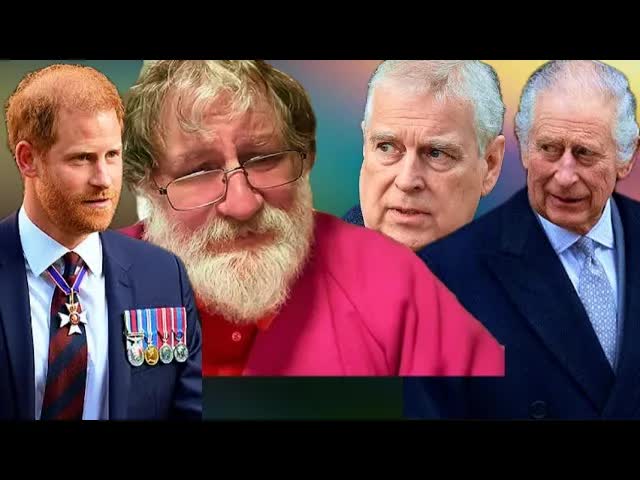The Controversial Saga of Prince Andrew and Prince Harry
When we think of royalty, we often envision a world steeped in tradition and dignity.
However, the ongoing controversies surrounding Prince Andrew and Prince Harry beg the question: has the royal family traded its regal status for celebrity-like scrutiny?
Recent media coverage seems to revel in the scandals surrounding these two princes, with outlets reporting on their misdeeds with an almost gleeful enthusiasm.
It’s a troubling shift that raises eyebrows and questions about the very nature of royalty.
Prince Andrew, the Duke of York, has found himself at the center of a storm of controversy, and rightly so.
His actions have drawn widespread condemnation, and many believe history will judge him harshly.
On the other hand, Prince Harry appears to be carving out a more positive legacy.
The stark contrast between their public images highlights the complexities of royal life in the modern age, where public opinion can shift like sand.
At the heart of Prince Andrew’s troubles lies a tangled web of allegations involving questionable associations and poor judgment.
His ties to convicted s offender Jeffrey Epstein have not only tarnished his reputation but have also raised serious moral questions.
Despite Epstein’s conviction in 2008, Andrew maintained his friendship with him, even visiting Epstein’s lavish New York home in 2010.
His attempts to explain this behavior during a 2019 BBC interview only deepened public skepticism.
Adding fuel to the fire, Virginia Giuffre, who claims to be a victim of Epstein’s trafficking ring, has accused Prince Andrew of sual misconduct.
She alleges that she was coerced into sual encounters with him when she was just 17.
While the prince denies these allegations, his lack of cooperation with investigations into Epstein’s activities has further fueled public distrust.
It’s a situation that raises serious questions about accountability and transparency within the monarchy.
The controversy doesn’t stop there.
Prince Andrew’s lavish lifestyle, funded by taxpayer money, has also come under fire.
His extravagant holidays and parties paint a picture of a man disconnected from the struggles faced by ordinary citizens.
His former role as the UK’s Special Representative for International Trade and Investment was marred by accusations of conflicts of interest, adding another layer of scrutiny to his already tarnished image.
In stark contrast to Prince Andrew’s tumultuous narrative is that of Prince Harry.
Esteemed Professor Tim Wilson has been vocal in his criticism of Andrew, labeling him as one of the most immoral members of the royal family.
Wilson’s words resonate deeply, challenging not just Andrew but the very foundations of the monarchy itself.
He calls for accountability and transparency, urging the royal family to confront the implications of Andrew’s actions.
While Wilson does not shy away from criticizing Prince Andrew, he also takes the time to commend Prince Harry for his dedication to public service.
Harry has emerged as a figure of hope, demonstrating a commitment to philanthropy and societal change.
From founding the Invictus Games to advocating for mental health awareness, he embodies a new standard for what it means to be royal in today’s world.
Harry’s decision to step back from royal duties has sparked debate, but it also reflects his prioritization of family and mental well-being.
Unlike his brother, whose actions have cast a shadow over the monarchy, Harry has chosen to use his platform for good.
This divergence in paths highlights the potential for the monarchy to evolve, focusing on compassion and service rather than scandal and shame.
As we reflect on the contrasting trajectories of these two princes, it becomes evident that the future of the monarchy hangs in the balance.
Prince Andrew’s missteps have left a mark on the royal family’s reputation, while Prince Harry’s efforts shine a light on a path forward rooted in service and integrity.
The choice is clear: the monarchy can either cling to outdated practices or embrace a new era of accountability and positive impact.
The discourse surrounding these royal figures is not merely about them; it speaks to broader societal values.
If we tolerate irresponsible behavior from those in power, what does that say about us?
Professor Wilson’s critiques serve as a reminder that we must hold our leaders accountable, regardless of their status.
His insights challenge us to reconsider what we expect from our institutions and those who represent them.
In examining the contrasting legacies of Prince Andrew and Prince Harry, we are reminded that true nobility lies not in titles or wealth, but in character and actions.
As the royal family navigates these turbulent waters, the public will continue to demand integrity and transparency from its members.
The time has come for the monarchy to reflect on its values and strive for a future that honors both tradition and progress.
As we conclude this exploration of royal controversies, let’s keep the conversation alive.
The actions of those in power matter, and it’s essential to celebrate the positive while holding others accountable for their misdeeds.
The royal family stands at a crossroads, and the choices they make will shape their legacy for generations to come.
